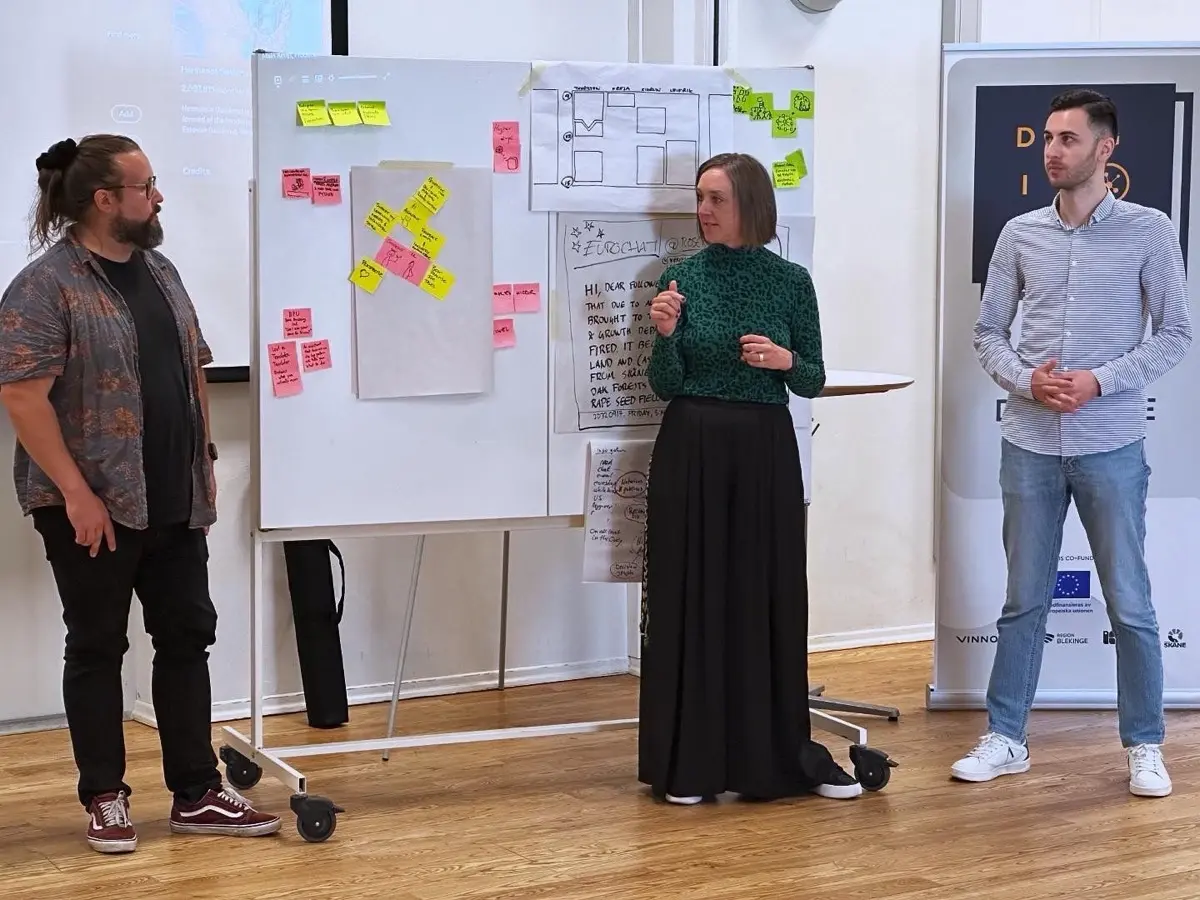NFL x Tech Concept Lab
An Immersive AI Summit/p>

The Workshop
Another productive collab with Tech Concept Lab — A Two-Day Workshop & Summit on possible futures of AI.
Summary
A Two-Day Design Fiction Workshop & Summit on possible futures of AI.
Written By: Julian Bleecker
Semantic Tags AISWEDENWORKSHOP
nfl-x-tech-concept-lab-ai-summit-workshop// import ImageGridDisplayGeneric from ”../../../../components/ImageGridDisplayGeneric.svelte”;
The times they are kinetic, dynamic, chaotic when it comes to the transformative potential we imagine for generative AI. The ways we imagine GenAI occupying our material and social worlds feels like it will alter the very fabric of how we live, work, play, and interact. From the way businesses organize, the way families interact and perhaps even are defined, to how communities engage and creative practices are, well — practiced — our future imaginaries are being influenced by the implied potential of GenAI. This is why it is vital that we become intential in our engagement with it rather than wait for it to happen or, even worse, continue to live within the future imaginary of the expansive dreamers who are telling us what it will become.
It is time for us to Imagine Harder.
In this spirit, Near Future Laboratory & Tech Concept Lab (TCL) collaborated on a two-day Design Fiction Sprint, bringing together nearly 40 of the most forward-thinking minds in Sweden’s innovation ecosystem, with industry experts from Ericsson, Istudios Visuals, Softhouse, Hyper Island, and other prominent institutions.
The aim of this sprint was clear: to move beyond abstract debates about AI and dive into the material exploration of the worlds we may want to create—futures where AI is as ubiquitous as wheels on luggage or running shoes. This exercise in Design Fiction was not about mere speculation or conjecture; it was about the creation of artifacts that imply real, possible futures. By crafting prototypes of tomorrow’s organizations, participants began to tangibly address how AI could influence public and civic sectors, academia, industry, and the creative economy.
The goal of the workshop was to first introduce the attendees to the philosophy, approach, and methodologies of Design Fiction, and then to use Design Fiction in consideration of the topic at hand _ the rapid advancements in generative AI and considerations and provocations as to the possible resulting implications. (With no emphasis on making predictions — rather using Design Fiction as a means of producing evocative conversations and discoveries of unexpected and curious outcomes for discussion.)
The schedule of activities was kept to about 4 hours per day, with a 45 minute lunch each day.
We started things with a Design Fiction 101 presentation. This is an introduction to Design Fiction that provides the background and context for Design Fiction that I give. It offers a deep dive into the core principles of using designed artifacts, what I mean by ‘artifact’, examples of Design Fiction projects that give a richer sense as to the approach and methodology, and emphasizing that the artifacts are not project proposals, nor predictions — but things that are meant to provoke meaningful conversations about what it may/can/should be to inhabit possible futures. I then facilitated an engaging and open Q&A, which I set the stage for the post-lunch ‘General Seminar’ session.
General SeminarAfter lunch we transitioned into an interactive segment with ‘General Seminar’ done live (it’s typically over Zoom). This is the platform I developed for participatory creative exploration of speculative futures (or adjacent nows.) The approach is to put participants in the mindset of an archeologist or detective who is wandering into hypothetical possible worlds where AI is normal, and wherein they “discover” artifacts that emerged from these speculative futures. The artifacts are meant to be implications of change — but they are ordinary things: a curious set of headphones; a refrigerator that keeps talking about dinner plans; a plant that is asking for its firmware update; a disposable headset at a corner store with 2 hours of interactive legal advice. To facilitate the experience of ‘wandering’ into these AI worlds, participants broke into smaller groups (2-3 individuals) to co-create and find objects like these that represented the implications of AI-driven societies. After a 30 minute round of ‘wandering’ we gathered back to share the artifacts that were found.
Day two of the workshop/summit shifted the focus from ideation to materialization. Groups refined their initial ideas, bringing their concepts closer to reality by crafting tangible artifacts that could exist in the AI-empowered futures they envisioned. This process wasn’t just about building prototypes but about manifesting worlds — organizations, tools, policies, and interactions — that participants felt were plausible and desirable. By the end of the day, these material explorations served as provocations, showing not only how AI might influence tomorrow’s organizations but also offering a vision of what kind of futures we might intentionally pursue.
Reflections and ResultsThis sprint yielded results that exceeded expectations. Through the creation of future prototypes, participants did not simply engage in theoretical discussions—they crafted tangible implications of AI’s role in reshaping our lives and work.
Supported by DigIT Hub, a European digital innovation hub, and funded by the European Union, this event set a precedent for future collaborations and explorations into how we, as designers, innovators, and citizens, can shape the AI-powered world of tomorrow. This gathering demonstrated the power of Design Fiction not only to anticipate future possibilities but to materialize and interrogate them in ways that provoke intentional, thoughtful progress.
Day 1 10:00-11:45 Intros and Design fiction 101 11:45-12:30 Lunch 12:30-14:30 General Seminar 14:30-15:00 Check out
Day 2 10:00-11:45 Design fiction workshop 11:45-12:30 Lunch 12:30-14:30 Find common ground 14:30-15:00 Check out
10 Ericsson (engineering and research)
8 professors/researchers from product development, media technology and software/AI engineering
5 from Hyper Island
4 from the Tech concept lab.
3 people from smaller tech and creative companies.
2 from the business incubator
2 from a government agency
1 Saab (same as above)
1 innovation strategist from the region
1 innovation/engineering expert from AI Sweden (semi-governmental organisation)